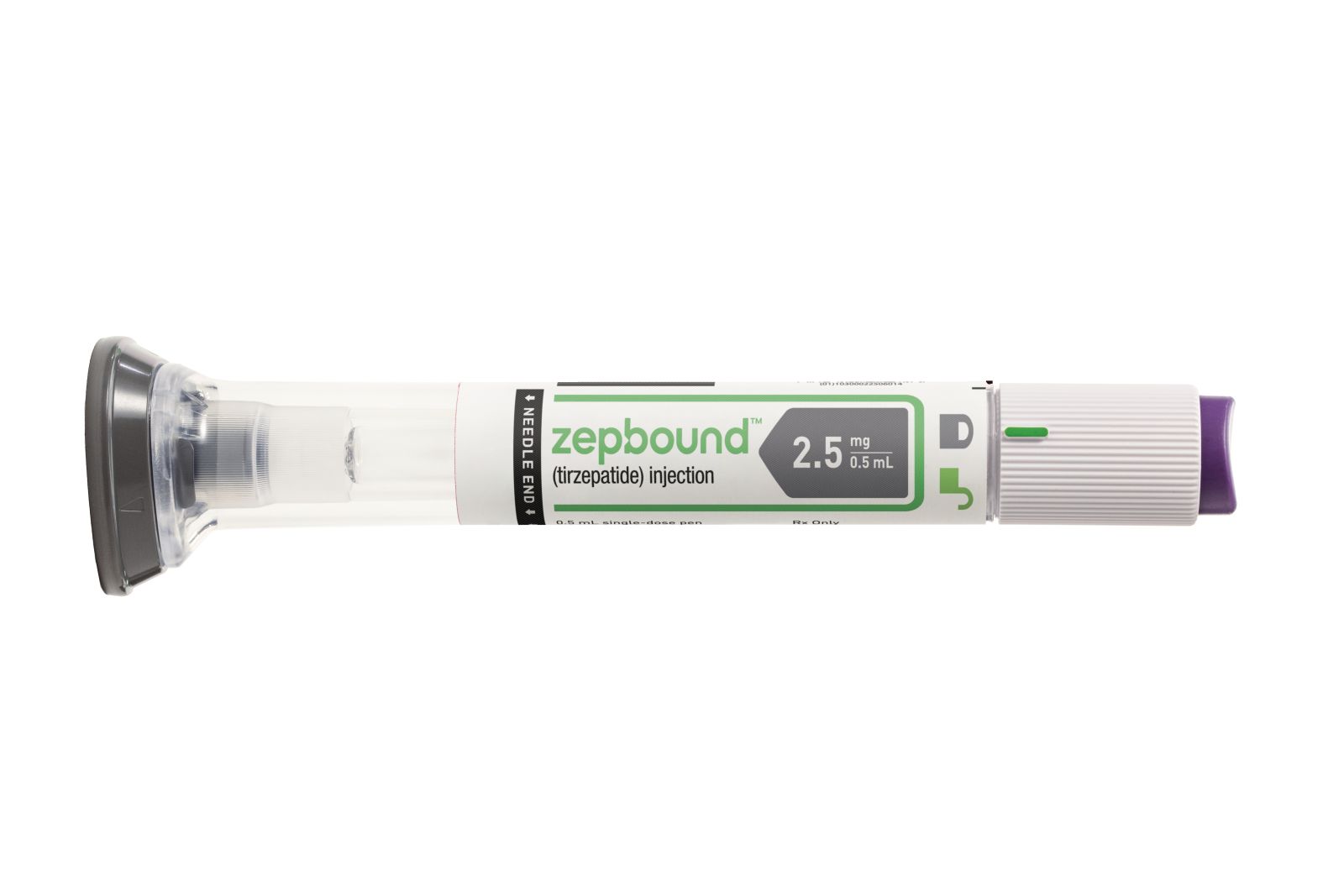Zepbound (Tirzepatide) FDA-Approved for Chronic Weight Management
By April Hopcroft
 After much anticipation, the diabetes medication Mounjaro is now approved under the name Zepbound to treat overweight and obesity. At the highest dose, Zepbound led to weight loss of up to 48 pounds.
After much anticipation, the diabetes medication Mounjaro is now approved under the name Zepbound to treat overweight and obesity. At the highest dose, Zepbound led to weight loss of up to 48 pounds.
Ever since Mounjaro (tirzepatide) was first approved in May 2022 to lower blood sugar in type 2 diabetes, there has been speculation about when the medication would be approved in people with obesity or overweight given its remarkable weight loss effects.
Now, the U.S. Food and Drug Administration (FDA) has approved Eli Lilly's tirzepatide for chronic weight management, alongside diet and exercise, under the brand name Zepbound.
With Zepbound’s approval, people who have obesity but not type 2 diabetes have another once-weekly injectable option – alongside Wegovy (semaglutide) – for weight management. The new weight loss drug may be particularly beneficial given the recent shortages of Wegovy and other incretin-based therapies.
What does this mean for people with overweight or obesity?
“The introduction of these second-generation medications is transformational in the care of patients with obesity,” said Dr. W. Timothy Garvey, director of the Diabetes Research Center at the University of Alabama. “These medications effectively treat a broad array of obesity-related complications and thus substantially augment our ability to improve quality of life and the health of patients.”
According to Dr. Vanita Aroda, director of diabetes clinical research at Brigham and Women's Hospital, this new generation of powerful weight loss medications may change how people with obesity think about long-term health goals.
With a wide array of options for managing excess weight, Aroda said there can be a greater emphasis on achieving person-centered goals – these could include goals such as improved mobility, performing household tasks, exercising, or playing with grandchildren, for instance.
Prior to Wegovy’s approval in 2021, there were a limited number of weight loss drugs available. Looking beyond Wegovy and Zepbound, there are several other drugs being developed that provide even greater weight reduction and fewer side effects than the currently approved medicines.
“The present days are very bright indeed for weight loss drugs and the future is even brighter," said Dr. Charles Alexander, an endocrinologist and diaTribe’s scientific and medical advisor
What is Zepbound?
Zepbound is a once-weekly injectable medication that will soon be available as an auto-injector pen at six different doses (2.5 mg, 5 mg, 7.5 mg, 10 mg, 12.5 mg, and 15 mg).

Tirzepatide was previously approved to treat type 2 diabetes in the U.S. and Europe. It’s also currently being investigated in numerous trials for diabetes-related conditions like chronic kidney disease, obstructive sleep apnea, and cardiovascular disease.
Zepbound joins Wegovy as the second incretin-based therapy for chronic weight management. Notably, Zepbound is the first dual incretin agonist to be approved for obesity. As a dual agonist, Zepbound targets two incretin hormone receptors – GIP and GLP-1 – to address underlying causes of excess weight.
How much will Zepbound cost?
Zepbound is expected to launch in the U.S. by the end of 2023 at a list price of around $1,060. Developer Eli Lilly notes that the list price is not indicative of the typical out-of-pocket cost after insurance coverage and discounts.
Lilly plans to offer a savings card to reduce out-of-pocket costs for Zepbound for people with commercial insurance. This would reduce the price to as low as $25 for a one to three-month supply using insurance that covers Zepbound.
For those who don’t have coverage for Zepbound, it would be around $550 for a one-month supply.
What does the research on Zepbound show?
Zepbound has been studied in several clinical trials through the SURMOUNT program, which includes four completed trials and multiple ongoing studies.
The FDA approval of Zepbound for chronic weight management was based on data from the SURMOUNT-1 and SURMOUNT-2 trials, which included nearly 3,500 participants in total.
Key findings from the SURMOUNT studies include:
-
In SURMOUNT-1, participants on the highest dose of Zepbound (15 mg) lost 21% of their body weight (about 48 pounds) from an average starting weight of 231 pounds.
-
Roughly 1 in 3 participants in SURMOUNT-1 taking the highest dose of Zepbound lost over 25% of their body weight.
-
In SURMOUNT-2, participants taking Zepbound 15 mg achieved weight reductions of 16%, losing an average of 34 pounds.
-
Nearly half of all SURMOUNT-2 participants on Zepbound were able to lower their A1C to what is considered a normal level, 5.7%.
-
Zepbound also led to improvements in triglyceride and cholesterol levels, blood pressure, and fasting insulin levels.
In people with type 2 diabetes, tirzepatide has been shown to lower uACR (a measure of kidney function) and benefit the heart.
Ongoing studies are investigating how Zepbound affects long-term cardiovascular health and how it works in specific groups of people, such as Japanese and Chinese people with obesity who don’t have type 2 diabetes.
Does Zepbound have side effects?
Similar to other GLP-1 receptor agonists, gastrointestinal issues are the most common adverse effects of Zepbound. In clinical trials, most participants reported some side effects, but they tended to be short-lasting and mainly occurred during the dose escalation period. Side effects may include:
-
Nausea
-
Vomiting
-
Diarrhea
-
Decreased appetite
-
Constipation
-
Abdominal pain
-
Indigestion
Contact your healthcare provider right away if you experience severe stomach pain or pain that won’t go away, a serious allergic reaction, changes in your vision, or mental changes that are new, worse, or worry you.
Who can be prescribed Zepbound?
At this time, Zepbound has only been approved for weight management among adults with obesity, or an average body mass index (BMI) of 30 or greater.
It’s also approved for adults with overweight (BMI of 27 or greater) who also have a weight-related condition like hypertension, dyslipidemia (high cholesterol), type 2 diabetes, obstructive sleep apnea, or heart disease.
Zepbound is currently being studied in younger populations but has not yet been approved for children and teens or people with type 1 diabetes.
Learn more about weight management and diabetes:







